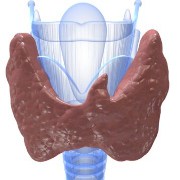Treatment
Treatment will depend on:
- Age
- Severity of symptoms
- Cause of hyperthyroidism
- Pregnancy status
Treatment options include:
Antithyroid Drugs
Antithyroid drugs work best for Graves' disease. Examples include:
- Carbimazole— Smoking can interfere with how your body uses this medication. *¹ If you smoke, talk to your doctor about how to quit .
- Methimazole
- Propylthiouracil
If the disease goes into remission, you may no longer need medication.
Radioactive Iodine
This is a common treatment in the US. Radioactive iodine is taken orally. It is then absorbed by the thyroid gland. Once there, it damages most of the thyroid cells. These cells can no longer produce thyroid hormones. Within days, the excess iodine passes out of the body in the urine or changes into a nonradioactive state. You may need to take a daily thyroid supplement.
Surgery
Surgery is rarely used for hyperthyroidism. Exceptions include:
- Young children
- Pregnant women
- Individuals with a very large goiter that causes either swallowing or breathing problems
Most patients take antithyroid medication before surgery. After surgery, you may need to take a daily thyroid supplement.
Beta-blockers
You may need to take beta-blockers . These drugs relieve rapid heart rate and jitters. Examples include:
Eye Protection
If there are eye symptoms, your doctor may prescribe:
- Eye protection before sleep
- Artificial tears
- Sunglasses
If you are diagnosed with hyperthyroidism, follow your doctor's instructions .
Please be aware that this information is provided to supplement the care provided by your physician. It is neither intended nor implied to be a substitute for professional medical advice. CALL YOUR HEALTHCARE PROVIDER IMMEDIATELY IF YOU THINK YOU MAY HAVE A MEDICAL EMERGENCY. Always seek the advice of your physician or other qualified health provider prior to starting any new treatment or with any questions you may have regarding a medical condition. Copyright © 2024 EBSCO Publishing All rights reserved.








